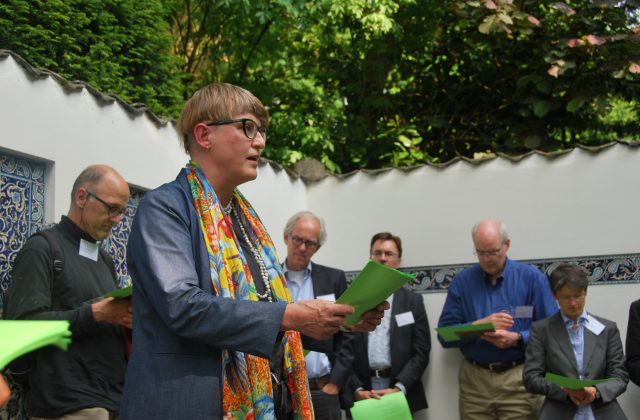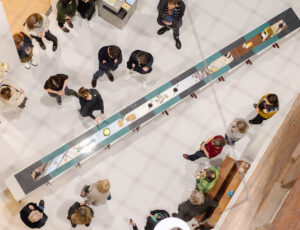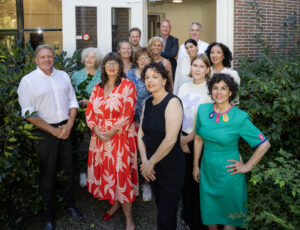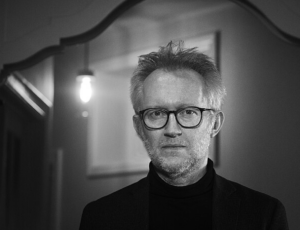The Language of the Messenger
“Some early morning, when the thought of leaving gained the upper hand over the inclination of staying, I saw him filling the seam of his mantle with roses, basil, hyacinths and scented herbs. I said: ‘You know, flowers don’t keep and the rose garden isn’t true to its promise and the wise men always said: don’t hang on to what doesn’t keep.” (Saadi, ‘The rose garden’, Dutch tr. by J.T.P. de Bruijn)
The young red leaf of the rose bush in April has again spread its denticulate green, a shadow
for a dunnock busy searching for insects, picking, cackling.
The sound of the airplane high above him doesn’t make him insecure, as it does me,
gone, gone, evicted? Or the way home, along cumulostratus clouds, like a god through the aether
with wings at his feet and a thyrsus wand.
Should I then maybe pick the budding ivy, say a Dionysian verse, pour a libation of Cretan
wine in the Rose Garden where there is no earth that receives it,
only an eternally frozen pond mirroring featherclouds?
‘Turn, turn, o Shulamite…’
I let the seams slip from my hands but didn’t turn around
to the blue of the tile tableau, and the peacocks,
to the two columns that are one entrance,
to the current between both.
Could I still go back? (‘Come back, come back, o Shulamite…’)
Is not the only job of the messenger: bring the message?
I am not the message
regardless which prince sends me to you.
I am writing the advice
that washes up after nine centuries at the address from which it had escaped
and is at first exotic, then a poem, and finally the breath of a poor dancer
dancing for God. Let me look at you,
an angel without body, without mercy,
be reminded that no one knows me better than you
and choose. There is no room for absence.
Even the robin tried to shoo me from the bench where I’m sitting with a book that doesn’t want to make headway,
a sun that doesn’t want to rise, a song that is drowning in the mint tea
that, cooled down, is now only luring girls/gnats/moths, no clear thoughts;
the shadow of Plato behind me on the outer wall doesn’t keep upright.
I swear an oath, I was sure of victory,
the laurel wreath in the kitchen breathing scents on the countertop,
the deaf ears of the white nettle reveling among the weeds
of my wishes and longings: homebound, homebound –
but home had gone, gone, become ashes, as we all shall – wait a bit, it won’t take long, it won’t hurt
or almost won’t, just like the dentist;
I dare not look.
I looked anyway.
Is the rule of law for everyone
or is it slaving, see that you get what you’re entitled to, you think,
or, what others say they are entitled to,
while the difference is not clear to you.
A passport has no skin color,
skin color has no passport,
a road has no more than a dotted line. In the middle.
A finch flies over the hedge
disregarding the neighbours
or the boundary between lands and properties.
There is but little as beautiful as reality
and I also don’t understand why I’m not welcome there,
like if I hadn’t paid my ticket.
I never paid, my mother did.
She’s in the earth between here and yonder,
it’s close, I brought a handful of earth,
look here, that cedar box upon my desk,
if I may call it that, a notebook on my knee.
Do you know where the song went? The song of the thrush,
also the song of the lichen, and of the hedgehog; and the basso continuo of a distant thunderstorm, counterpoint
of the imprint of a horseshoe, three days old, in the snow.
Blood’s stuck to it.
The bleeding of gold paint of an icon, among thousand candles,
the bleeding of a red jacket in the morning light,
the blood of a man who has been lying on the ground for three days.
Old blood. Black as printer ink, as repulsion, as the eye of fear,
there is nothing more to say.
I thought.
Then the moon rose,
in three parts, one for each quarter;
breathe, depth there is no more.
But:
the magpie intervened. ‘Call!’
‘Call, call!’
If no one calls, it can also be evening
and day and afternoon, and again evening;
but morning it is not.
Someone should call.
Someone should call, really hard
and then someone should call,
and someone calls. Someone, and someone, and someone
and someone: call.
The magpie spread its tail until everywhere was a royal blue;
until we saw that the cumulostratus and the featherclouds,
until we saw that the Wild Hunt and the causes of death
and the untraceable bullet and the empty command,
until we saw that beneath language,
that beneath language, there was a cavity.
A small cavity. Just okay for the vole to hide,
for the song to collect a keynote,
for one sunflower seed that did root and sprout, and was trampled,
and thus did nourish the same soil that had brought it forth.
I looked at the moon.
I looked at the moon and I took my glass of wine and agile,
like a dervish dancer, with one hand raised and one hand down-
ward, so
I poured it, three drops of red and sweet, and
trembling, mature like me, eternal, ripe like God, like photons
from the hand of the Maker: thank you. Thank you, my beloved. I now know
that you exist.
There is a way. I don’t know where it is.
There is a way. I do hear distant chiming,
a ship sails past and there’s no water to be seen,
a blue heron flies over with no map or compass. Or GPS.
Someone cut out the leaves of the maple tree against the sky,
someone collected the light of the stars in a mantle,
someone was singing softly about a new foundation.
Like this God intended the world,
like this, I know for sure.
Not with certainties but with doubts.
With the beauty of eternal ignoramus.
With the love of may be lost and gone.
Oh, open the door, I’ll step inside!
For somewhere there’s a new, and always old, address.
*
Translation from “De taal van de boodschapper” by Maria van Daalen, with advice by Annemarié van Niekerk.
More
The original Dutch version “De taal van de boodschapper”
Translation in Afrikaans (by Annemarié van Niekerk)
About Maria van Daalen




